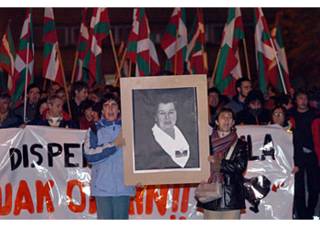Arnaldo Otegi lent the strength needed for the plan by Basque Prime Minister Juan José Ibarretxe to be approved.
The zipayos from the PP and the PSOE are licking their wounds.
The message is clear, the future of the Basque Country will be decided by the Basques.
Here is the note from Yahoo News:
Basque Autonomous Plan Set For Shock VictoryVITORIA, Spain (Reuters) - A Basque proposal for virtual independence from Spain gained vital and unexpected support in the regional parliament on Thursday from Batasuna, a party banned as the political wing of armed separatists ETA.
The proposal by Basque premier Juan Jose Ibarretxe, a moderate nationalist, would enshrine the region's right to self-determination through a referendum and create a "status of free association" with Spain.
Ibarretxe presents his plan as a means to end ETA's campaign of bombings and shootings that has killed about 850 people since 1968, but Spain's ruling Socialists and main opposition Popular Party say it is unacceptable.
Batasuna, which was outlawed in 2003 but still fills the seats in the regional parliament it won before the ban, had originally rejected the scheme for not including the Spanish region of Navarre and three provinces of southwest France.
But Batasuna leader Arnaldo Otegi made a surprise announcement that three of his party's parliamentarians would vote in favor of the Ibarretxe plan later on Thursday -- thus giving it an absolute majority, crucial for its approval.
"When it comes to voting, we are going to say yes to self-determination ... and to a popular vote," Otegi told the assembly.
If approved, the plan would pass to the national parliament in Madrid where it is certain to be rejected, with the Socialists and Popular Party both set against it. However, even to get that far would be a symbolic victory for Ibarretxe.
The controversial proposal could cause trouble for the government of Prime Minister Jose Luis Rodriguez Zapatero, which relies on small regional parties for its parliamentary majority.
Zapatero has relaunched dialogue with Ibarretxe that had been frozen under his predecessor Jose Maria Aznar, whose government was so angered by the Basque leader's plan it threatened to throw him in jail.
Yet like Aznar, Zapatero considers the Ibarretxe plan a breach of Spain's 1978 constitution and will not accept it in anything like its present form.
Earlier, Batasuna supporters clashed with police outside the Basque regional parliament in Vitoria while the Ibarretxe plan was being debated.
Several hundred protesters waving Basque flags and banners demanding complete independence from Madrid tried to stage a protest just outside the parliament building until the police charged. (Additional reporting by Inmaculada Sanz and Emma Pinedo in Madrid)









